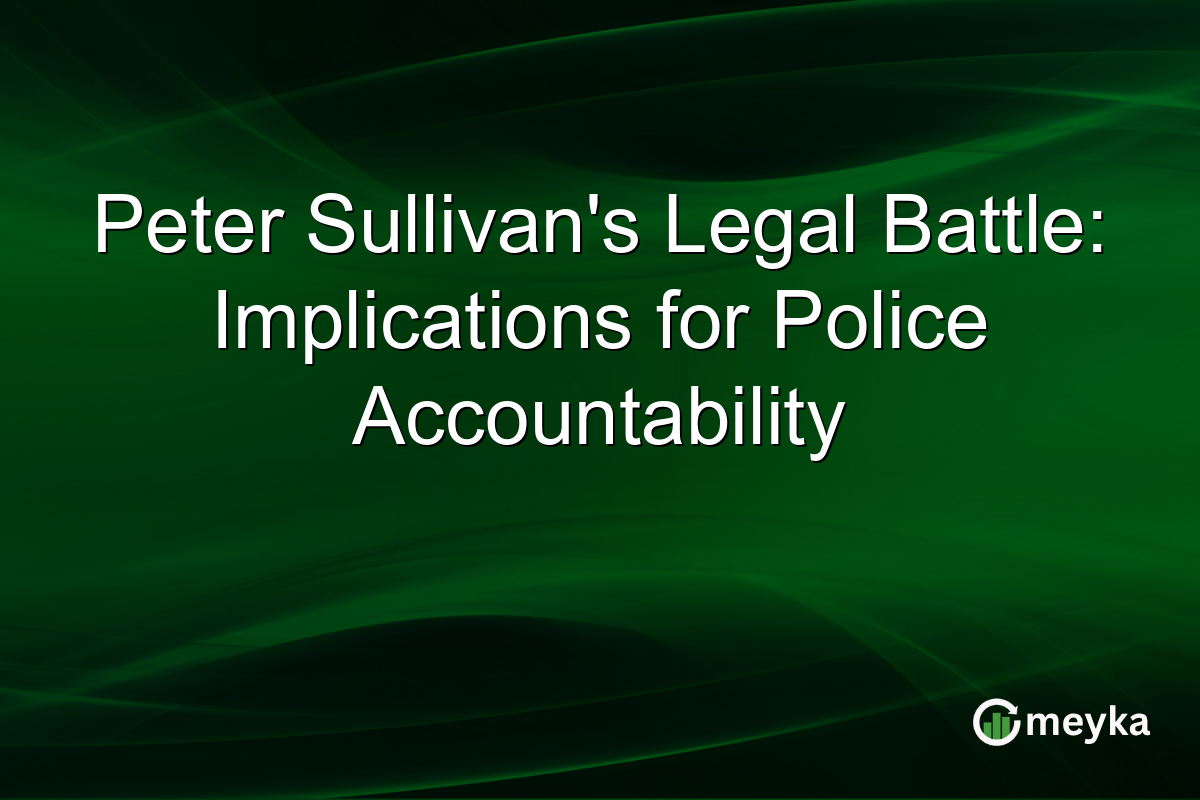Peter Sullivan’s Legal Battle: Implications for Police Accountability
The recent developments in the Peter Sullivan case have captivated public attention in the UK, reigniting debates about police accountability. Sullivan, who was wrongfully convicted decades ago, recently gave an interview shedding light on police misconduct and judicial errors that led to his imprisonment. This renewed focus has prompted calls for systemic reforms, emphasizing the role of transparency and integrity in law enforcement processes.
The Peter Sullivan Case: A Wake-Up Call
Peter Sullivan’s case has become a symbol of the broader issue of wrongful convictions. Originally found guilty of a crime he didn’t commit, Sullivan’s struggle underscores significant failures in the justice system. The emergence of new DNA evidence, not available at his original trial, played a crucial role in proving his innocence. This revelation underscores the impact that advanced technology can have on addressing miscarriages of justice. In Britain, the case has sparked widespread public concern and debate about the reliability of police conduct investigations.
Implications for Police Accountability
The Sullivan case spotlights the urgent need for reforms in police accountability. It raises questions about how evidence is handled and the integrity of investigative procedures. These issues are not isolated, suggesting systemic flaws that may affect others. Currently, there is increasing demand for more stringent oversight of how police investigations are conducted, ensuring that no individual is wrongfully prosecuted due to negligence or misconduct. This case also paves the way for considering legislative changes to better regulate police practices.
Policy Reforms and the Role of New Evidence
Policy reforms are on the horizon as a response to the Sullivan case. There is significant attention on integrating new DNA evidence protocols within the justice system to minimize the risk of future miscarriages of justice. The UK government is likely to review existing protocols and possibly introduce new legislation to strengthen the reliability of forensic evidence. Social media discussions highlight public support for such reforms, with many calling for immediate action to prevent further miscarriages.
The Way Forward for Law Enforcement in the UK
For many, the Peter Sullivan case serves as a crucial turning point for law enforcement practices in the UK. By highlighting systemic issues, it urges stakeholders to adopt more transparent and accountable measures. The focus is on building a justice system that is not only efficient but also fair and just. This includes mandating updated training for officers on handling evidence and conducting unbiased investigations to restore public trust. This case, covered extensively in the media (bbc.com/news/articles/cd04x43vg1ko), emphasizes that accountability and reform are essential pillars for future policing.
Final Thoughts
The Peter Sullivan case has amplified voices demanding police accountability and judicial reform in the UK. It serves as a stark reminder of the potential for miscarriage of justice in the absence of transparency and rigorous standards. Moving forward, the focus must remain on legislative changes that incorporate new technologies and ensure fair investigative processes. As Britain seeks to uphold justice, the case underscores the necessity for reforms that not only rectify past errors but also prevent future injustices. These steps are crucial for fostering a more trusted relationship between the public and law enforcement.
FAQs
The Peter Sullivan case highlights significant issues in the justice system, particularly wrongful convictions due to police misconduct. It emphasizes the need for better investigative processes and has prompted calls for systemic reforms.
New DNA evidence allows for more accurate and reliable criminal investigations. In Sullivan’s case, it was pivotal in establishing his innocence, highlighting its importance in preventing miscarriages of justice.
There is potential for legislative changes focused on police accountability and oversight. These reforms aim to integrate advanced forensic technologies and set higher standards for evidence handling in law enforcement.
Disclaimer:
The content shared by Meyka AI PTY LTD is solely for research and informational purposes. Meyka is not a financial advisory service, and the information provided should not be considered investment or trading advice.






